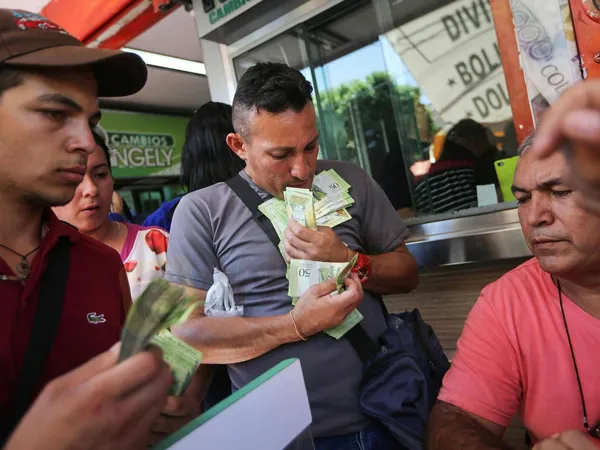简体中文
繁體中文
English
Pусский
日本語
ภาษาไทย
Tiếng Việt
Bahasa Indonesia
Español
हिन्दी
Filippiiniläinen
Français
Deutsch
Português
Türkçe
한국어
العربية
Venezuela's inflation hit 686.4% in 2021 - central bank
Abstract:Venezuela's annual inflation rate hit 686.4% in 2021, demonstrating a deceleration of consumer price growth versus the previous year when inflation was 2,959.8%, the country's central bank said on Saturday.

Venezuela's annual inflation rate hit 686.4% in 2021, demonstrating a deceleration of consumer price growth versus the previous year when inflation was 2,959.8%, the country's central bank said on Saturday.
Monthly inflation in December rose 7.6% and, since September, the inflation rate has remained in the single digits.
The deceleration in prices follows government measures which include the restriction of credit and lower spending in bolivars to maintain the stability of the exchange rate.
As a result of this strategy, government entities and state-owned oil company PDVSA now pay suppliers in cash with foreign currency.
During an interview broadcast on state television at the start of this month, Venezuela's President Nicolas Maduro said hyperinflation - which ran for four years - had been left behind.
Despite measures to improve supplies and control inflation, prices remain high and continue to hit the earnings of Venezuelan families, limiting their ability to buy goods like food and medicine. A minimum monthly salary is equivalent to $1.50.
In 2019, amid hyperinflation and economic collapse, Venezuela's government relaxed economic controls, allowing greater quantities of foreign currency to circulate, which provided some sectors with breathing space.
The central bank has yet to publish data regarding the country's economic growth.
For more Forex news, please download WikiFX- the Global Forex Regulatory Inquiry APP.
Disclaimer:
The views in this article only represent the author's personal views, and do not constitute investment advice on this platform. This platform does not guarantee the accuracy, completeness and timeliness of the information in the article, and will not be liable for any loss caused by the use of or reliance on the information in the article.
Read more

Inflation is Here—How Will It Hit Stocks, Forex, Crypto, and Commodities?
Inflation is a force that ripples through every corner of the financial world, reshaping investment landscapes, shifting market sentiment, and altering the trajectory of economies. From Wall Street to the foreign exchange market, from digital assets to raw materials, inflation's impact is far-reaching. Traders who fail to understand its influence risk being caught off guard, while those who adapt can seize profitable opportunities.

Oil Prices at $90 to $100 Could Push Philippines Inflation Beyond Target
Rising oil prices at $90 to $100 per barrel may push Philippines inflation above the 2-4% target in 2025-2026, impacting food, transport, and electricity costs.

What’s Driving Malaysia’s Inflation in 2025?
Inflation in Malaysia is projected to rise to as much as 2.8% in 2025, driven by domestic policy adjustments, wage increases, and external market fluctuations.

This Economic Indicator Sparks Speculation of a Japan Rate Hike!
The latest data shows that Japan’s base wages in November rose by 2.7% year-on-year, marking the largest increase in 32 years, fueling speculation about a potential BOJ rate hike, but Governor Kazuo Ueda’s dovish remarks in December have shifted market expectations toward a potential delay in policy adjustments.
WikiFX Broker
Latest News
Germany's Election: Immigration, Economy & Political Tensions Take Centre Stage
WikiFX Review: Is IVY Markets Reliable?
IG 2025 Most Comprehensive Review
Construction Datuk Director Loses RM26.6 Mil to UVKXE Crypto Scam
SEC Drops Coinbase Lawsuit, Signals Crypto Policy Shift
Top Profitable Forex Trading Strategies for New Traders
EXNESS 2025 Most Comprehensive Review
ED Exposed US Warned Crypto Scam ”Bit Connect”
New SEC Chair Paul Atkins Targets Crypto Regulation Reform
WikiFX Elites Club —— Fun Spring Camping in Malaysia Successfully Concluded!
Currency Calculator







